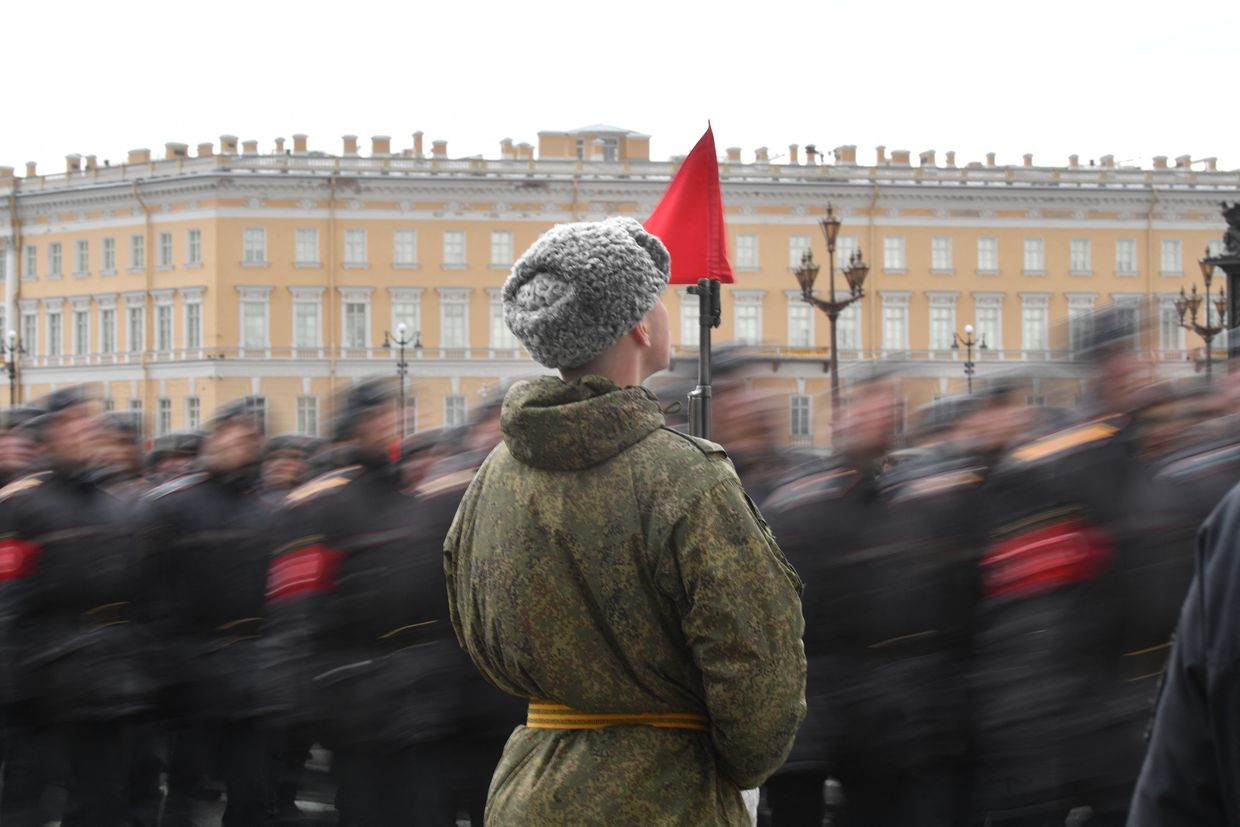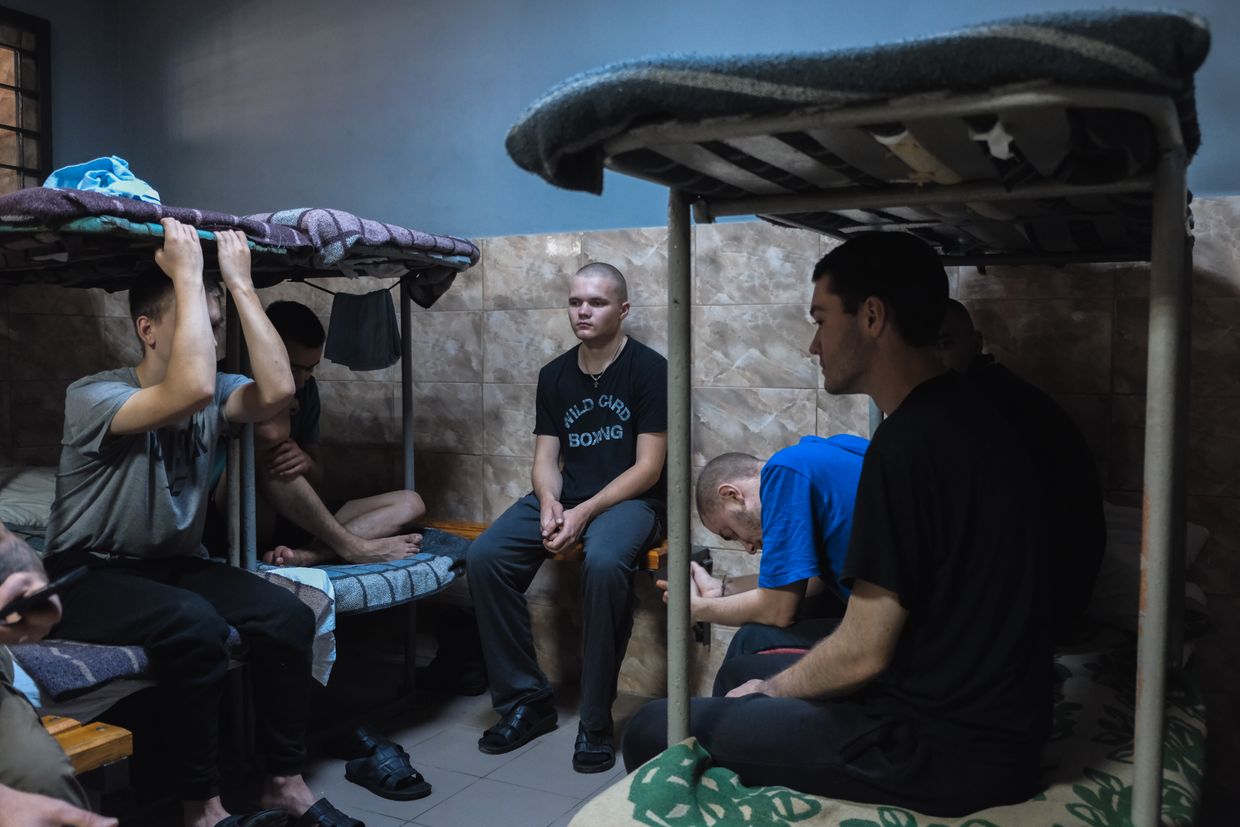Russian POW phone call restrictions spotlight Ukraine, Russia’s treatment of prisoners

Russian prisoners of war, captured in the Ukrainian incursion into Russia's Kursk Oblast at an undetermined location in Sumy Oblast, Ukraine on Aug. 30, 2024. (Diego Herrera Carcedo/Anadolu via Getty Images)
Last week, Ukraine’s Ombudsman Dmytro Lubinets announced that Russian prisoners of war (POWs) would no longer be able to make phone calls to relatives.
They are still allowed to communicate through letters, meeting Geneva Convention requirements, he noted.
The decision came after recent increases in reports of violations of Ukrainian POW rights by Russians, including a video circulating on social media last week that appeared to show a Russian soldier executing a Ukrainian POW in violation of international laws.
Lubinets has asked the United Nations (UN) and the International Committee of the Red Cross (ICRC) to investigate. The Kyiv Independent was unable to independently verify the video.
Neither Russia nor Ukraine disclose how many POWs are in captivity. The numbers are estimated in the thousands for both sides. As of July, Russia had released 3,310 Ukrainians from captivity since February 2022, President Volodymyr Zelensky said.

Prisoners of war — primarily members of the military and armed combatants who are captured by the enemy side — have strict protections under the Geneva Conventions that outline requirements for their humane treatment once captured.
Both parties in the conflict are required through these laws to protect the “life and dignity” of prisoners of war, said Pat Griffiths, spokesperson for the International Committee of the Red Cross (ICRC) in Ukraine.
“The law as it relates to prisoners of war should be followed because it’s a good thing in itself and reflects foundational values that we all share,” said Griffiths. “It shouldn’t be thought of in reciprocal terms. We shouldn’t want to break the law if the other side does.”
Access, communication, and information
Per the Geneva Conventions, to which both Ukraine and Russia are signatories, international organizations have the right to unrestricted access to POW camps to assess their conditions through visits and confidential interviews.
According to the UN, Russia has continued to deny its monitors access to Ukrainian POWs, while Ukraine has provided the UN with “full and confidential” access to official places of internment.
ICRC staff have visited thousands of POWs in Ukraine and Russia, but “our access is not where it needs to be,” said Griffiths. Under international humanitarian law, the ICRC has the right to visit all POWs, wherever they are held — but the obligation is on parties to the conflict to grant that access.
The ICRC does not publicly criticize individual sides in a conflict, in order to preserve the neutrality that allows it to carry out its humanitarian work. Instead, it flags humanitarian concerns directly and confidentially with those involved.
Ukrainian officials, however, have said that the “vast majority” of Ukrainian POWs who were released have said they were never visited by Red Cross representatives.
International law also requires detainees to be given the option to inform families and an independent agency of their status immediately after their capture and to send regular letters and cards.
In the UN’s most recent periodic report on human rights in Ukraine, some families of Ukrainian POWs reported they had yet to receive confirmation of their family member’s capture after more than a year, despite confirmation from released POWs that their relatives were held in captivity.
The majority of the 20 relatives interviewed by the UN had not received any letters, while the rest had received only a short phone call or card. Released Ukrainian detainees have also reported illegal threats and censorship of the content of their letters.

“The worst is not knowing. All our lives are circling around the fact that our close ones are in captivity,” one mother of a Ukrainian POW who has been in captivity for almost two years told the UN.
Ukrainian authorities have facilitated communication between Russian POWs and family members with letters and phone calls, the UN reports. An earlier report had flagged delays in facilitating communication, sometimes months-long, with the most recent publication flagging “improved access to communication” of monthly phone calls and official encouragement to write letters in one of the camps.
Treatment in captivity
Independent observers and journalists have documented conditions for Russian POWs and interviewed them.
Because of access limitations, however, most of what the international community knows about Russia’s treatment of Ukrainian POWs comes from interviews conducted after prisoner swaps.
In Russia and Russian-held areas, the UN has found “documented patterns of widespread torture and degrading treatment or punishment of POWs in Russian captivity, as well as conditions of detention that fail to comply with international law.”
The most common form of torture described by released POWs was “welcome beatings,” which involved beatings, threats, dog attacks, tasing, stripping, and the use of stress positions. The UN described the torture as systematic.
In a March 2023 report on POWs, the UN found that 92% of Ukrainian POWs interviewed had experienced some form of torture or ill-treatment during their captivity, with 84% experiencing torture and ill-treatment during internment after their initial capture. Recent UN reports from 2024 are consistent with these patterns.
The same 2023 report found that 49% of Russian POWs had experienced torture and ill-treatment by Ukrainians, though primarily upon capture. The most common forms were “beatings, kicking or, to a lesser extent, stabbing.” Fifteen percent experienced torture or ill-treatment after they reached their place of longer-term detention.
Reports from 2024 have continued to find some cases of violations of Russian POW rights during transit to official detention areas, including beatings and electric shocks, though they did not document violations by Ukraine once Russian POWs reached official detention camps.

The UN warned that exact figures should not be directly compared to each other, because the level of access has strongly influenced what the agency is able to document. However, “in overall terms, POWs in the hands of Ukraine were treated in better fashion, once held in transit and permanent places of internments.”
"in overall terms, POWs in the hands of Ukraine were treated in better fashion, once held in transit and permanent places of internments"
The UN has recorded cases of summary executions in violation of international law on both sides. The most recently recorded cases of executions committed by Ukrainians occurred in early 2023. The UN has received more than two dozen credible accounts of summary executions by Russia in 2024 and has called on the country to cease such executions.
Russia’s human rights commissioner Tatyana Moskalkova did not respond to questions about the treatment of Ukrainian POWs held by Russia.
Petro Yatsenko, a representative of the Ukrainian Coordination Center for the Treatment of POWs, told the Kyiv Independent that violence against POWs is possible when prisoners are first captured, attributing it to high emotions on the battlefield.
“We’re working to improve that, and it’s very important for us to create informational and educational programs for Ukrainian military personnel to avoid such cases,” he added, noting that Ukraine has invited transparency and has made improvements to POW conditions over the course of the war.
“It’s very painful for Ukrainian relatives to know how well Russian soldiers and officers are treated in comparison with the behavior of the Russian side,” Yatsenko said, “but of course for us, it’s very important not to be the same as Russians.”












